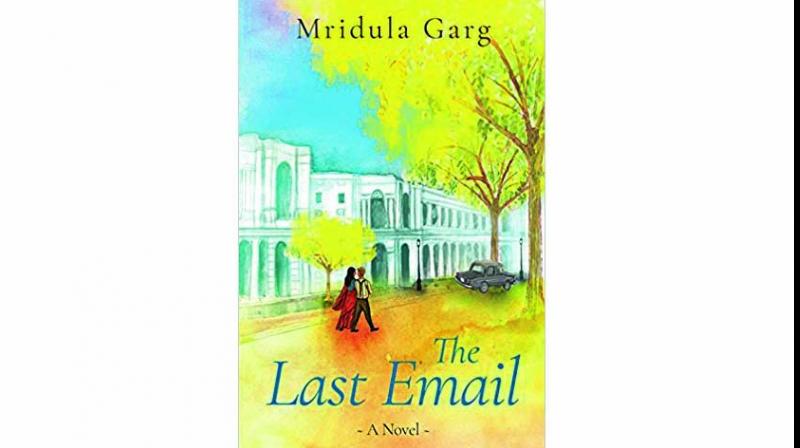Turning recorded experience into fiction
The Last Email is less a work of the imagination than an experiment at turning recorded experience into fiction.

Indian writers have experimented before with epistolary novels, i.e. novels constructed as exchanges between characters. The fewer the characters the more difficult the exercise is likely to become — in one sense — since the exchanges would then become restricted to only between a handful and the same kind of prose for different participants could become embarrassing — everyone would end up sounding like the author. An epistolary novel with only two characters might be even more testing since an author would then be required to invent two distinct prose styles, each one representing a character.
Mridula Garg is one of the strongest voices of Hindi literature and, in writing over 25 volumes, she has courted controversy many times. Her novel Chittacobra (1979) led to her brief arrest for obscenity. That novel was about a woman locked up in an unsatisfactory marriage who enters into a sexual liaison with a young Scottish missionary. Chittacobra is at the centre of The Last Email since it is about the writer Maya who meets her former lover Kevin, a Scottish missionary, now grown much older, on the internet and they resume their passionate relationship, this time as a series of emails. Maya is the author of Chittacobra which, she reveals to Kevin, got her arrested on charges of obscenity. Other books she has authored includes Kath Gulab, part of Garg’s own oeuvre.
As may have been gathered, the novel is autobiographical although Garg has evidently embellished and sharpened it. The email exchanges being partly from her actual life could awaken inquisitiveness among the reading public, especially those who speculate pruriently over the relationship between fiction and the authors’ actual pasts. But since so much of the novel is evidently factual, an aspect of literary interest here is how actual relationships are processed into fiction since the novel has a unity and focus that real life, I believe, lacks.
There are two aspects about real life romantic relationships that fiction does not often take note of. The first has to do with the element of power implicated in even the most passionate relationships.
It is perhaps difficult for lovers to eschew gaining an advantage over each other in the name of love — at least to the extent of trying to get each other do his or her bidding. However strong the attachment, the “equilibrium” needs to be established between the two, the stronger partner holding the advantage; still, such clear-eyed assessments do not usually accompany romance in fiction where unconditional “love” rules.
In The Last Email, Maya and Kevin are both achievers but it is Maya who emerges as the dominant partner since the emails frequently revolve around her work and Kevin’s praise of it. One recognises in Maya’s forceful correspondence the natural propensity of the assured author, who relishes nothing more than the approval of his or her readers, even when they are lovers.
Kevin may be accomplished but unlike Maya he has nothing to show and that makes a difference. Most of what Kevin appreciates — like Chittacobra and his realisation that it is a fictionalised rendering of their own relationship — lies outside the pages of the novel but Garg includes one or two bits of short writing in their entirety for us as well.
The short story Recantation, also about an illicit relationship, is powerful in its evocation of the schism between lovers in the dying moments of their relationship despite their desire for each other.
The second aspect usually missing in fictional exchanges is the level of “polyphonicity” one encounters in everyday life. Since everyone lives within his or her own field of consciousness, messages are rarely understood by recipients as they are meant to be and miscommunication results.
The sense that people are living in different planes of existence, rendering perfect communication impossible, is caught by very few novelists and Russians like Dostoyevsky (whom Garg admires) could be among the few who do. Garg, because she is partly transcribing an actual exchange, is able to produce something rare: she conveys the sense of two lovers living with other private preoccupations, their mutual love for each other becoming only one aspect engaging them. Kevin, for instance, adores his wife and confesses this to Maya but he is widowed without warning. This brings home the fact that the major aspect of his life is outside Maya’s purview. One might expect in fiction that he and Maya would grow closer but what happens instead is that they separate. It is difficult to interpret this in behaviourist terms but one might conclude that illicit love needs barriers to thrive. The fewer the barriers the less attractive and more humdrum love naturally becomes.
The Last Email is less a work of the imagination than an experiment at turning recorded experience into fiction.
Letters are particularly useful here because communications through letters have already been considered and whetted, already “literary” in some sense. Readers will understand this proposition better when they compare email correspondence to social media exchanges, which are impulsive and unconsidered.
Mridula Garg’s experiment is a triumph, which means that it could show the way for a new kind of fiction writing in India, where the imagination is chronically hindered by what “should be”, by prescriptiveness, not only with regard to social behaviour but also literary observation. How things are has usually much greater interest to the educated reader than any kind of imagined construction.
The writer is a cultural/film critic with seven books to his credit. He is the author of The Oxford India Short Introduction to Bollywood.
